By Robert St. Martin & Valerie Milano
DUINO Wins Special Mention and Audience Award at NewFest, Bringing Its Award Total to 12
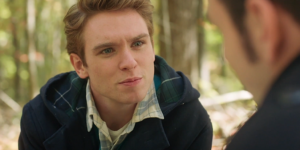
Los Angeles, CA (The Hollywood Times) 10/23/24 – Duino is a coming-of-age story that follows Matias, a gay Argentine filmmaker in his forties, struggling with an unfinished movie inspired by his elusive first love to Alexander, a Swedish friend he met at an international school in the 1990’s. This inspired story is, in many ways, a semi-autobiographical account of co-director Juan Pablo di Pace who wrote the screenplay. It is perhaps no coincidence that Duino, on the Adriatic near Trieste in northeast Italy was the inspiration for Rilke’s famous Duino Elegies (1923), metaphysical poems about love and loss as well as the fading of memories: “The things of experience are falling away, since / what ousts and replaces them is an act with no image. / An act, under a crust will split, as soon as / the business within outgrows it, and limit itself differently.”
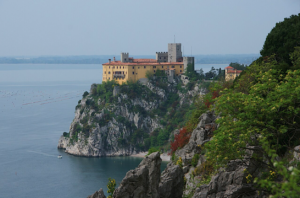
Some of you may recall Juan Pablo de Pace as an actor playing the role of Oscar in The Mattachine Family (2023). He has teamed up with Andres Pepe Estrada, a Spanish director and editor of a number of films including Francis Ford Coppola’s Tetro (2009) and Pablo Trapero’s White Elephant (2012.
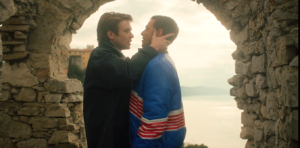
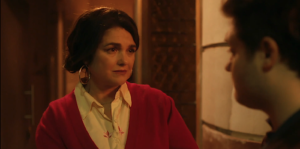
When college-age Matías (played by Santiago Madrussan) attended an international school on Italy’s Adriatic Coast, he was completely captivated by the creative atmosphere and sense of freedom he immediately experienced at the very-real United World College of the Adriatic, located near the city of Trieste on the Adriatic. The eclectic array of students at the college are from around the world and most on scholarships like Matías. He is immediately approached by a Swedish rebel named Alexander (Oscar Morgan) who comes from an aristocratic family. Alexander’s crazy energy and out-going style endears Matias to him immediately and, since he shares the same room with him at the college, Matias finds himself furtively falling in love in Alexander.
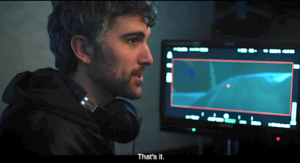
Decades later, as a filmmaker, Matias is back in Bueno Aires as a filmmaker and trying to finish a film based on his own experiences as a young man. Writer and co-director Juan Pablo di Pace (who plays the older Matias) draws on his own life for this somewhat autobiographical film. He himself attended the very United World College of the Adriatic in his youth. At the start of the film, the older Matias is directing the final shooting of a scene from his unfinished film and upset with what the two young male actors are doing in bed while supposedly sleeping. One is hesitantly trying to touch the hair of the other as a sign of intimacy but fails to touch his head. The shot upsets Matias terribly and his producer Paolo (Juan Cruz Márquez de la Serna), who was once Matias’ best friend as well, convinces him that the final shot is fine.
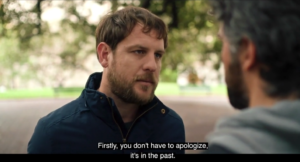
Matias’ discomfort with the scene of two young men in bed stems from his own unresolved memories of his experience with the young Swedish student at the college. This is the seed of the drama that takes place at the present time, as Matias ponders the events from his own past. While Duino starts in the present day, the flashbacks to Matías’ college years in Italy gradually take over, and we see what has so captivated and obsessed Matías for decades: Namely, the energy and promise of young lives, the unrequited yearning for a just-out-of-reach lover. It is these memories that will both inspire and haunt Matias and give Duino a delicious and sexy poignancy.
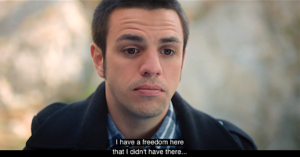
Tenderness and fascination define their strong friendship, which is short-lived when Alexander is suddenly expelled from the international school, leaving young Matias with an unresolved story of undeclared emotions. Much of the tale of their friendship is shaped by school itself which is located in part in the Duino Castle which dates back to1389. The original older castle in ruins once controlled the trade routes running along this section of the Adriatic Sea and eventually fell to the Habsburg archdukes of Inner Austria who ruled the Friuli region until 1917. Below the ruins of the ancient castle there lies a white rock projecting into the sea, the Dama Bianca, which resembles a veiled woman and gave origin to Gothic legends which Alexander shares with the newly arrived Matias.
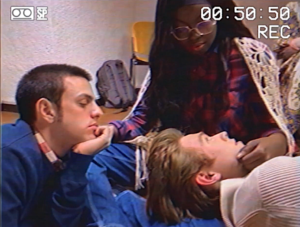
Held by the descendants of the Della Torre noble family from the 16th century onwards, the estates were inherited by Marie von Thurn und Taxis (1855–1934) in 1893. A patron of the arts and socialite, she accommodated the Austrian-German poet Rainer Maria Rilke at Duino Castle from 1911 to 1912 and he dedicated his Duino Elegies to her. This historical resonance enriches both the importance of the school and its location in the memory of young Matias, who enjoyed photographing the faces of other students, especially the face of Alexander.
What complicates the experience of young Matias at the school at Duino is the sudden arrival of his best friend Paolo (Tomás Kirzner) from Buenos Aires, who comes to visit for a week. Paolo is obsessed with making movies and, with his super-8 camera films Matias, Alexander, and other students. This film footage is captured on Paolo’s camera and transferred later to a VHS tape by Paolo. When Paolo has dinner back in Buenos Aires with Matias’ family, Matias’ mother Roma (Araceli González) asks Paolo how Matias is doing in Italy. Paolo shows the family a few scenes from his VHS recording but stops because he realizes that Matias became completely smitten with Alexander and is actually crushed by sudden expulsion of Alexander from the school.
This VHS footage becomes the key link in the mind of middle-aged Matias to the autobiographically based story he is trying to retell as a fictional film. It also opens the Pandora’s box of Matias’ conflicted feelings for Alexander, as his discerning mother discovers. The plot of the film moves along with the past comminating the present, as Matias’ mother Roma convinces her husband that they need to go to Sweden to check up on their beloved son. It is Christmas time and Alexander is back in Stockholm with his parents and his beautiful younger sister Kathrine (Julia Bender). Alexander invites Matias to visit him and his family for a Swedish Christmas – in a letter accompanied by a train ticket.
Arriving in Sweden, Matias discovers that Alexander’s family is very wealthy and live in a palatial villa but are also very welcoming and kind-hearted. Alexander is overwhelmed by the attention and love of the entire family, but some fissures began to happen with the arrival of Alexander’s sister Kathrine from her boarding school and home for Christmas. Alexander’s somewhat effusive mother invites Matias’ parents to join them at their villa for a holiday visit. Once again, Matias is wrapped in the warmth of his own parents and Alexander’s family. But he is also conflicted about his attraction to Alexander and the distracting attention given to him by Alexander’s sister Kathrine.
All the unresolved issues Matias experienced as a young man continue to haunt him 24 years later when he suddenly gets an invitation from Kathrine (Krista Kosonen) in Sweden to her wedding. Should he go and find out what has happened to Alexander after so many years? As a filmmaker, Matias risks discovering that life imitates art. If he goes to Sweden for Kathrine’s wedding, how will he deal with being face-to-face with Alexander (August Wittgenstein) after this huge passage of time? And what should the ending of the film he is making really show?
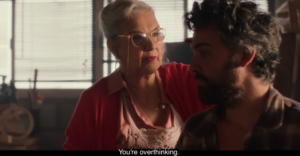
The acting in this film is convincingly realistic. Juan Pablo Di Pace as the older Matias embodies the role so well, but after all the story behind the film touches possibly upon his own experiences at Duino. Santiago Madrussan as the young Matias so well captures the complex emotions of a young man falling in love and uncertain what that means when the loved one seems so far out of reach. The hesitancy of the loving touch hovers in the space of Matias’ mind and serves as a metaphor for unrequited love. In all, Duino is a strikingly beautiful story about trying to revisit the past of one’s memories and wondering what love might have been.





